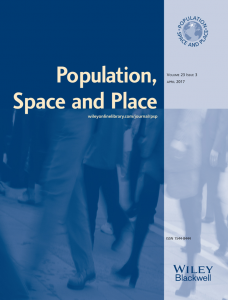Five tips on applying for a PhD
Graduate Student Advice Month

The view from my favourite coffee shop in Anyang, South Korea – where I plotted my escape to UK academia.
When you’re partway through something, it rarely occurs to you to stop and remember how you got there in the first place. I’m around a year-and-a-half into my PhD programme now, and as part of Sociology Lens’ graduate advice month, I thought I’d write up some tips on how to apply for a PhD. Doing so has made me recall exactly how I got here in the first place, and it all started, like so very few stories do, in a coffee shop in a suburb of Seoul…
Back in the Autumn of 2012 I was an ESL teacher in Korea, plotting my escape. Flights home were already booked for the following March, and I was hoping (and, at times, close to praying) that I would be able to transition smoothly from ESL teacher in Korea to PhD student in the UK. Somehow, amazingly, those hopes and prayers became a reality, and in September 2013 I started my PhD in Sociology and Social Policy at Southampton University, funded by the ESRC.
Here are five tips which may or may not be blindingly obvious. Disclaimer: these are only my thoughts based on my experience as someone who’d been out of both academia and their home country for a few years. Like many things, there are many different ways to get a PhD place, but, all that said, here are my five tips on applying for a PhD:
1. Get a strong proposal – This is the part which took me so many hours, days, weeks, cups of coffee and packets of cigarettes sat with my laptop in that cafe in Korea.
My proposal went through many drafts, and eventually it followed this basic structure: Motivation for my research; existing literature on the topic; the ‘gap’ in the literature which I was seeking to fill; and my proposed methodology. It was about 2000 words long, it was written in fairly academic language and it included a bibliography.
Some PhD studentships, often advertised on sites like findaphd.com or jobs.ac.uk, are based within existing research projects for which Universities are looking for suitable candidates. The advantage of applying for these PhDs within existing projects is that (a) you don’t need to come up with your own ‘original’ proposal and (b) there is usually a pot of money available already. But I wanted to study my project and not just ‘fit into’ someone else’s. This can make it harder because you have to make your own proposal which is attractive, and you need to find suitable supervisors and funding. Cue, tip 2…
2. Edit your proposal down to an e-mailable introduction – I had my proposal but I needed to find a University department that had (a) the relevant staff, and (b) funding. I knocked up a short introduction which I could email around. This introduction said who I was (name, age), my academic background (details of my undergrad and MA), what I wanted (to do a PhD in the field of ‘X’), a paragraph or two about my research interests, and the offer of sending my full proposal in future. Who did I send this to?…
3. Find the right people – This was the most critical part of my quest to get a PhD place, and also the most time-consuming and frustrating. I wasn’t sure where to start so I went through some of the journals and books that were most pertinent to my research and started emailing key authors and researchers in the field. Following the advice of my MA dissertation tutor, I purposefully avoided university website ‘contact us’ pages, and admin staff contacts, and went straight to the academics. It is the academics who know the funding routes available (or who ought to), and whose interest you want to gain. I mean no offence to University administrators – for starters, they are much better at replying to their emails – but it’s the academics who you want on your side. If they think your proposal is good, they will find ways to get you to their department. So…
4. Don’t be shy – I was emailing academics that were often quite well-known and had publications lists as long as my arm. At first I found this intimidating, until I started getting replies and I realised that, first of all, academics enjoy the flattery that comes from would-be PhD students contacting them; and secondly, any academic worth their salt will answer such emails, and if they can’t help you, they usually know someone who can.
I got many replies that went like this: “Dear Roger, Thanks for your email. Your proposal is very interesting but at University A we do not have the funding and/or staff to support a PhD application of this nature at this time. However, you may wish to contact Dr. B at University C who may be able to help you. Best wishes, Professor D.”
Eventually, after weeks of emails like this, I started to get somewhere, and I found academic staff who had both the expertise and the funding to get me a place…
5. Cast your net wide – It is tempting, once you have the ‘ear’ of a sympathetic academic somewhere, to think that the search is over. You might be required to attend an interview or do a skype interview. If that goes well, you fill out an application form, do the necessary admin bits and bobs required of the University, and wait for the formal offer. But remember that PhD places, especially ones that are full-funded, are very competitive, so cast your net wide and keep looking for a Plan B or Plan C.
In the end, I applied to five universities (and had skype interviews with two of those). Three of those universities offered me a place. Only two of those places came with funding. One of those two universities was in the middle of nowhere. So I had a choice of two universities. I made my choice (the one that had a better reputation in my field, and wasn’t in the middle of nowhere) and I’m very happy with it.






1099-1328/asset/dsa_logo.jpg?v=1&s=e4815e0ca3064f294ac2e8e6d95918f84e0888dd)
Hi Roger. This is very similar to my experience, except I took a big gamble re: ‘tip 5’. I only applied to one course and luckily I got in. I don’t know what I would have done or where I would be now if I hadn’t!
The one thing I would add to this list is that you have to sell yourself, and particularly your unique strengths (whatever they are) in your application. People are often too humble, or just too scared, too say what they are actually good at and blow their own trumpet. Also, this means that if you have experience in one thing that most people don’t (for me that was living and working in Ecuador) then that is what you need to play up. If you specialise in studying one country or region or have experience in one field (such as environment/ecology), you should apply to do things that are directly related to that.
If you apply for something you are interested in but have little experience of, there will probably be someone, somewhere who is a better candidate. As you say, it is really competitive and so you don’t have to be really smart and have loads of experience, you have to be better suited than whoever else is applying.
Great post! I really enjoyed it. I will look through some of your previous ones when I have a bit more time on my hands.
Cheers George, and yes you make a good point. It can be a strange thing to ‘sell yourself’ in applications but it is necessary, and we often have personal skills and experiences which we don’t realise can help us stand out.
Interesting how so many things hinge on networking and salesmanship. This should be more about intellect and a good idea rather than personality.
You need to be a part of a contest for one of the
finest sites online. I will recommend this site!
I pay a quick visit daily a few blogs and blogs to read articles or reviews, but this webpage gives feature based content.
Its not my first time to pay a visit this site, i am browsing this web
page dailly and get fastidious facts from here all the time.
Hello, I think your website might be having browser compatibility issues.
When I look at your blog in Ie, it looks fine but when opening in Internet Explorer,
it has some overlapping. I just wanted to give you a quick heads up!
Other then that, wonderful blog!
It’s really very complicated in this active life to listen news on Television, therefore I only use internet for that purpose, and
obtain the newest information.
Hello all, here every one is sharing these kinds of familiarity,
thus it’s pleasant to read this blog, and I used to pay a quick visit this webpage daily.